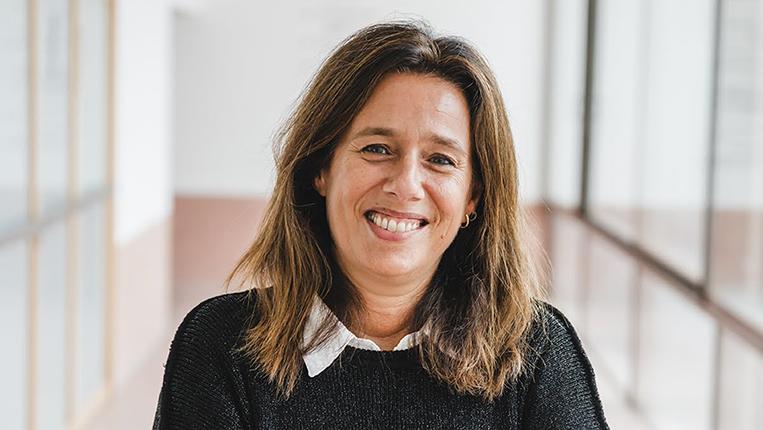Interview with Mafalda Parente, third-year Psychology student at FEP-UCP
At the Faculty of Education and Psychology of the Universidade Católica Portuguesa (FEP-UCP), students’ commitment goes far beyond the classroom. Many engage in extracurricular projects aimed at generating real social impact, applying the knowledge they acquire in contexts that help transform communities. Mafalda Parente is one such example. A third-year Psychology student, she is part of the Finance4Youth association, which promotes financial literacy among children and young people, helping them develop a healthier and more conscious relationship with money. In this conversation, Mafalda shares how psychology and financial literacy intersect, and how she has helped bring this often technical subject into schools in a simple and engaging way.
How did you get involved with Finance4Youth and what are the main goals of your work?
I joined Finance4Youth in 2025, in the Education and Training Department, and it’s been an incredibly enriching experience. The association’s main mission is to promote financial literacy from young people to young people, making topics like saving, investing, financial planning and conscious consumption more accessible and practical. We believe financial education is essential for autonomy and wellbeing, and should be taught from an early age, just like any other life skill.
In my case, I’m mostly involved in preparing and delivering training sessions in schools. We want to show that financial literacy isn’t just “talking about numbers”, but about learning to make more conscious, balanced decisions that align with our goals.
Psychology and financial literacy seem like distinct areas. How do you combine them in your activities?
The connection between the two is what fascinates me most about this project. The way we deal with money is full of emotional and behavioural components, such as fear of loss, anxiety about the future, and impulsive spending. Psychology helps us understand what lies behind these decisions and develop more effective strategies.
In our sessions, we talk a lot about financial habits, social influence and self-esteem. These are factors that directly affect how we manage money. Ultimately, changing financial behaviour isn’t just about making a budget – it’s also about working on the emotional relationship we have with money.
Financial decisions: between reason and emotion
How does psychology influence our financial decisions?
It influences almost all of them. Even when we think we’re being rational, there’s always an emotional side involved. We buy things to feel better, postpone decisions out of fear, and repeat patterns learned in childhood, based on how our parents handled money.
Emotions and social context play a huge role. We can be overly optimistic, influenced by comparisons, and end up spending more than we should. Psychology helps us recognise these tendencies and build a more balanced relationship with money, which is essential for both financial and emotional wellbeing.
What kind of initiatives have you promoted in schools, and what impact have they had on pupils?
The school activities are one of the most meaningful parts of the experience. We create interactive sessions on topics such as money management, saving, responsible consumption and financial planning. We always adapt the content to the pupils’ age, using practical examples, games and challenges.
The impact has been very positive. Many pupils say they had never thought about how they spend money and that they’ll start managing their pocket money better. It’s amazing to see how we can spark interest in a topic that might initially seem boring or distant.
Is there a particularly memorable experience you’d like to share from your time with the association?
I clearly remember the first session I led, with a Year 4 class. We asked: “If I gave you ten euros right now, what would you do?” The answers ranged from “I’d buy an ice cream” to “I’d save it in my piggy bank”. That simple question opened up space to talk about choices, priorities and saving in a fun way.
During the session, I used a curious technique to grab the class’s attention: I turned off the lights for a few seconds. That pause created surprise and immediate silence. From then on, I realised how important it is to adapt communication to the audience. In the end, I felt they had learned as much about money as I had about how to communicate and listen.
What skills do you think are essential for those who want to take part in projects like this?
The most important is the willingness to learn. No one joins a project like this knowing everything. Then I’d highlight communication, teamwork and empathy, because we’re always dealing with people of different ages and backgrounds. It’s also crucial to have critical thinking and adaptability, as social impact projects require creative solutions, resilience and stepping out of your comfort zone. That’s what makes the experience so incredible.
“Take the risk”: Mafalda’s advice to fellow students
What advice would you give to other FEP-UCP students who want to get involved in extracurricular projects with social impact?
Take the risk. Even if you feel you don’t have enough experience, these projects are where we grow the most. They’re opportunities to apply what we learn in class, meet new people and see how psychology has a real impact beyond university.
Moreover, these projects help us develop skills that don’t appear on the curriculum, such as leadership, empathy, organisation and critical thinking. And, more importantly, they help us realise the value of contributing to something bigger and using our knowledge to create positive change, especially with children.







